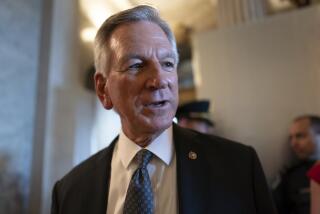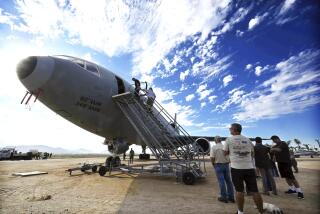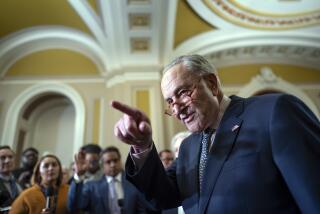Senators Reject Clinton’s Choice to Lead Air Force
WASHINGTON — In a stinging rebuke to President Clinton, a Senate panel Wednesday killed the candidacy of the first black ever nominated to be Air Force secretary because of doubts about his candor and veracity.
On a dramatic tie vote, the Senate Armed Services Committee voted down the selection of Daryl Jones, a Florida state senator and former fighter pilot, after long and anguished deliberations over his business dealings and record in the Air Force Reserve.
Rejection of a candidate to be a secretary of a military service is unprecedented in modern times. But opponents argued that inconsistencies in Jones’ testimony to the committee made it impossible for him to provide strong leadership at a time when the Air Force, facing the strains of a post-Cold War adjustment, badly needs it.
Sen. John W. Warner (R-Va.), a former Navy secretary, said Jones would be “unable to serve as a leader and inspire those who serve under him, particularly those in uniform.”
Defenders argued the criticisms--including a charge that he sought to sell Amway products to a subordinate--were greatly overblown. They asserted that race was a factor.
Sen. Carl Levin of Michigan, the committee’s ranking Democrat, said of the allegations against Jones that “sometimes when there is smoke--there is only smoke.”
Jones’ rejection represents a major miscalculation on the part of the Clinton administration, which knew before the hearings about the allegations against Jones but apparently underestimated their severity.
With Jones’ supporters unable to muster the votes to win approval, some members moved to send the nomination to the full Senate without a recommendation. But that motion failed on a 9-9 vote, as did a motion to send it to the Senate with a negative recommendation.
The eight Democrats on the committee all voted to send the nomination ahead with no recommendation. Nine of the 10 Republicans voted against the motion; the exception was committee Chairman Strom Thurmond (R-S.C.), who was persuaded to back Jones by Sen. Thad Cochran (R-Miss.), a longtime Jones supporter.
The vote is a setback for the president, who generally has sought to avoid controversy in nominations for the military--a sensitive area for him because of the controversy over his draft record. But Clinton, who has been eager to break new ground by installing women and minorities in top military posts, lobbied hard for Jones, a political acquaintance whom Clinton had invited to stay in the Lincoln Bedroom and to fly with him on Air Force One.
Clinton reportedly met with Jones for about 15 minutes Wednesday.
“He was an outstanding candidate for this position, and he deserved the opportunity to be considered by the full Senate,” Clinton said. “I thank Mr. Jones for his willingness to serve his country. I am confident that he will continue to make vital contributions to Florida and to our nation.”
On the eve of the vote, Clinton, Defense Secretary William S. Cohen and National Security Advisor Samuel R. “Sandy” Berger all phoned senators in hopes of cinching a vote that was clearly going to be close.
“There are a lot of losers in this, but the biggest is the president,” one Senate aide said.
Mike McCurry, the White House press secretary, said the administration is “clearly disappointed” that the committee didn’t accept a man it viewed as a “highly qualified, superb nominee.”
Asked for reaction, Jones said none of the objections raised against him “made logical sense to me.” He said he would keep his reserve status and return to Florida to campaign for reelection.
“My constituents are very supportive. . . . I hope I am welcomed back with open arms,” he said. He filed for reelection to his state Senate seat last week.
Jones, 43, has the kind of personal story that has always attracted the president.
Raised in a poor family in Mississippi, Jones was nominated by Cochran to attend the Air Force Academy, from which he was graduated with honors. He compiled a meritorious record flying F-4 fighter planes and went on to careers in law, investment banking and politics. He was once chosen as the Florida Senate’s Democratic majority leader.
During Jones’ nomination process, both senators and witnesses remarked on his affability.
But soon after he was chosen last fall, people who knew him in the Air Force and in business came forward to challenge his record.
Four principal issues were in dispute:
* Jones had contended that he had chosen to voluntarily give up flying in the Air Force Reserve, while a superior said he had been grounded.
* Jones told the committee he had 2,000 hours of flying time, while official records showed he had 215 hours as a student pilot and 1,184 as a certified pilot. Jones later notified the committee of his mistake.
* Jones accepted about $1,700 in supplemental Air Force flight pay that continued for 3 1/2 years after he ceased flying.
* An Air Force enlisted man told Senate investigators that Jones had sought to sell Amway products to him, in violation of Air Force rules that bar business transactions with subordinates. Jones said he had never knowingly sought to sell products to any subordinate, although he acknowledged that he may have done so unwittingly when he spoke to groups of sales prospects in civilian settings.
In testimony, Air Force officers acknowledged that there was a racial component to some pilots’ dislike of Jones. Officials of Jones’ reserve unit, eager to boost their minority representation, set aside some usual procedures to bring him into the wing; this fact was noted by white pilots and stirred some racial animosity toward him from at least a small group, officers said.
In six committee sessions on the nomination, Jones’ defenders were able to point out facts that mitigated the conflicts.
They asserted, for example, that Jones’ superior had given him a choice between taking a desk job and pleading before a Flight Evaluation Board that he should be able to keep flying.
In this sense, they said, he was correct in his claim that he voluntarily chose to take the administrative job.
The defenders pointed out too that the Air Force routinely continues flight pay supplements after pilots cease flight service, although not ordinarily for the full 3 1/2 years for which Jones received the extra money.
But critics on the committee faulted Jones for repeatedly amending his testimony when confronted with contradictions in the record.
Sen. Rick Santorum (R-Pa.) said that Jones might have sailed through the process had he been completely candid from the start with the committee. But “I don’t think his performance before the committee was inspiring.”
Some GOP members faulted the administration for proposing Jones as a candidate when, they said, it was clear that he would face opposition.
Kenneth M. Bacon, the Pentagon’s chief spokesman, said the administration knew of the accusations about Jones last year but after investigating them did not find merit in them.
“We didn’t think they should have been crippling problems,” he said.
Several Republican senators predicted that the confirmation of Jones would have demoralized many in the Air Force, which has recently been struggling with various problems, including the loss of valuable pilots to a booming civilian airline industry.
One Air Force officer, who spoke on condition of anonymity, agreed that there was concern among some in the service that Jones might not live up to the military’s standards.
As testimony continued, “I think people here got increasingly concerned,” the officer said.
More to Read
Get the L.A. Times Politics newsletter
Deeply reported insights into legislation, politics and policy from Sacramento, Washington and beyond. In your inbox three times per week.
You may occasionally receive promotional content from the Los Angeles Times.











